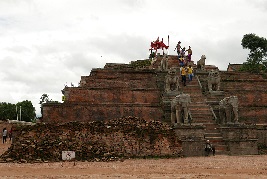



Unique as far as its time span (1960-2015) is concerned, this collection helps researchers understand the changes that have taken place over a long period of time. It is exceptional in terms of the information it provides about the urban, rural and religious architecture of the Himalayan regions over the last decades of the twentieth century, but also about their inhabitants and their beliefs, all of which enables us to witness for ourselves, thanks to multimedia applications, the practices, techniques and rituals that no longer exist or have been substantially transformed.
Monument prior to the 2015 earthquake...

Other than specialists of the Himalayas, for whom these archives are a wealth of information, this collection may interest a wider audience : geographers and climatologists working on climate change and its impact on populations and landscapes, art historians and experts in the history of technology, heritage conservators and restoration specialists, architects, gallery owners, contemporary artists, etc., not to mention the local people where the materials were collected.
...and afterwards !
 The series of devastating earthquakes that hit Nepal in the spring of 2015 causing more than 9,000 deaths, wiping dozens of villages off the map and destroying numerous historic sights on the UNESCO World Heritage List, such as Darbar Square in Kathmandu, reminds us tragically of the scientific and patrimonial importance of archives.
The series of devastating earthquakes that hit Nepal in the spring of 2015 causing more than 9,000 deaths, wiping dozens of villages off the map and destroying numerous historic sights on the UNESCO World Heritage List, such as Darbar Square in Kathmandu, reminds us tragically of the scientific and patrimonial importance of archives.
Thanks to funding from the Consortium Archives des Ethnologues and – following the earthquake that hit Nepal – from INSHS, a first inventory was drawn up and part of the archive collections was reconditioned and scanned. These collections will be hosted online in stages via ODSAS (Online Digital Sources and Annotation), a platform for archiving, annotating and transcribing digital resources in social and human sciences.
To meet requests from our Nepalese counterparts and our
 subsequent offer of providing them with the data produced in their country, we have decided, as our priority, to scan and provide information about the photographic and audiovisual materials for the areas particularly affected by the series of earthquakes in 2015 ; these are posted online in accordance with the rules governing intellectual property.
subsequent offer of providing them with the data produced in their country, we have decided, as our priority, to scan and provide information about the photographic and audiovisual materials for the areas particularly affected by the series of earthquakes in 2015 ; these are posted online in accordance with the rules governing intellectual property.
 The Centre for Himalayan Studies joined the Consortium Archives des Ethnologues at the end of 2012. Its aim is to inventory and digitise audiovisual, photographic and manuscript archives that have been put together by researchers who have carried out long periods of fieldwork since the 1960s in the Himalayas, and especially in Nepal which timidly opened its doors to foreigners in 1951.
The Centre for Himalayan Studies joined the Consortium Archives des Ethnologues at the end of 2012. Its aim is to inventory and digitise audiovisual, photographic and manuscript archives that have been put together by researchers who have carried out long periods of fieldwork since the 1960s in the Himalayas, and especially in Nepal which timidly opened its doors to foreigners in 1951.
![]()
Today CEH manages eight main collections, each named after the researcher who compiled it :
![]() Emile BAYLE archive collection
Emile BAYLE archive collection
![]() Marc GABORIEAU archive collection
Marc GABORIEAU archive collection
![]() Mireille HELFFER archive collection
Mireille HELFFER archive collection
![]() Gérard TOFFIN archive collection
Gérard TOFFIN archive collection
![]() Miscellaneous archive collection
Miscellaneous archive collection
For a detailed description of the archive collection, see the pdf document below.
To consult our digital collections, please go to the ODSAS platform.
Voir en ligne : Consortium Archives des Ethnologues






